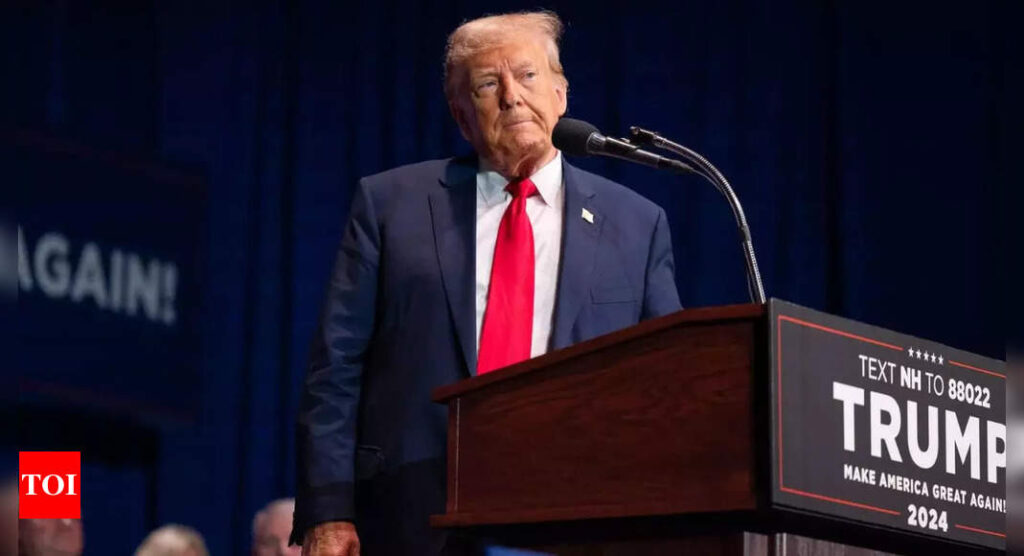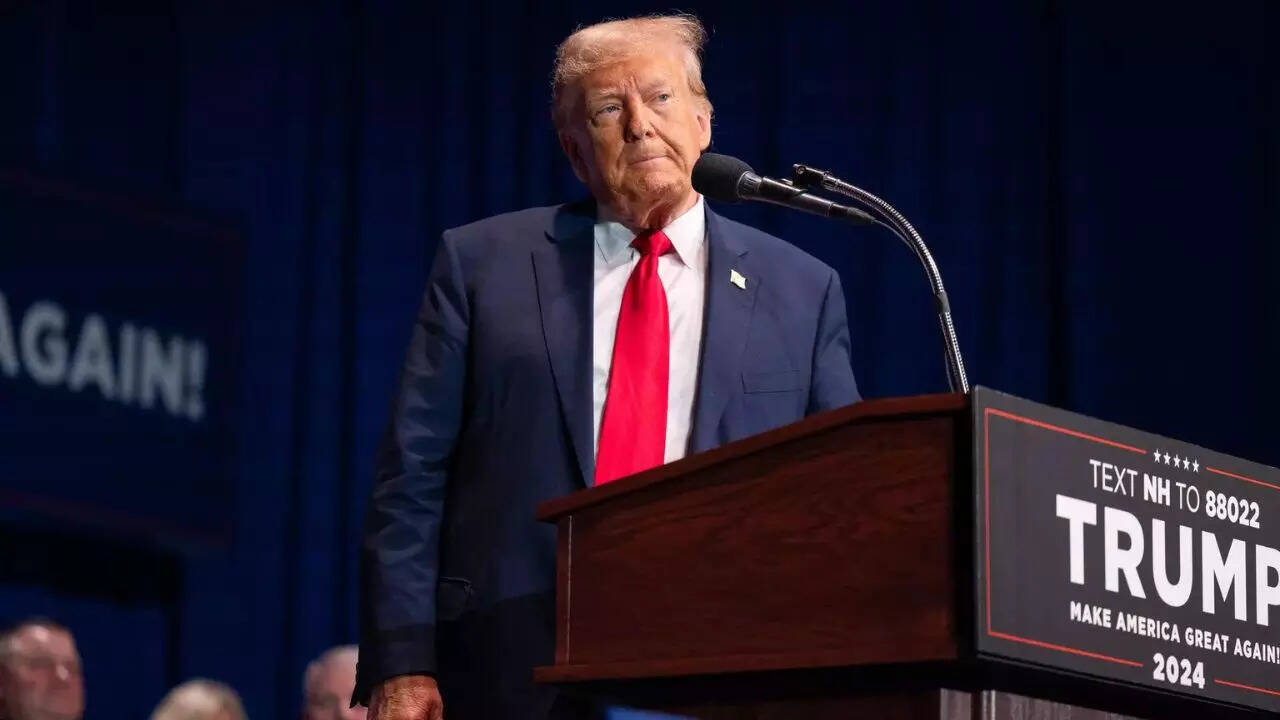[ad_1]
NEW DELHI: In recent days, former US President Donald Trump‘s reported provocative and politically incorrect language, which has long been framed as an asset by his supporters, has raised concerns over the potential for violence among his inflamed base. The former US president and 2024 presidential candidate has made remarks that some critics consider to be a troubling escalation in his rhetoric, reports the Associated Press.
Trump’s latest statements include implying that the country’s top military officer should be executed and making light of a home invasion involving the elderly husband of a political foe. These comments have not only sparked outrage but also led to fears of potential violence among his ardent supporters.
Last week, Trump allegedly made comments about illegal immigrants that were deemed extreme by some critics. The Anti-Defamation League (ADL), a prominent Jewish advocacy group, expressed concerns that his rhetoric echoed Nazi propaganda. Trump’s statement, “Nobody has any idea where these people are coming from, and we know they come from prisons, we know they come from mental institutions, insane asylums, we know they’re terrorists,” drew attention from the ADL’s Jonathan Greenblatt, who pointed out parallels to Hitler’s infamous complaints about Jews “causing a blood poisoning of Germany.”
The ADL’s concerns are just the latest in a series of controversies surrounding Trump’s rhetoric. Over the years, Trump has been known for exhortations to violence, such as suggesting that protesters should be “roughed up” at a rally in 2016 and advocating for looters to be shot during the 2020 racial protests following the murder of George Floyd by police.
His unsubstantiated claims of election fraud in the 2020 election reached a crescendo when he addressed an angry crowd on January 6, 2021, which subsequently attacked the US Capitol. Many participants in the Capitol insurrection later told investigators that they believed they were acting on Trump’s orders.
While Trump’s inflammatory remarks used to generate significant media coverage and public shock, his language no longer carries the same weight it once did. However, recent comments, particularly his mockery of a hammer attack on the 83-year-old husband of Democratic former House speaker Nancy Pelosi and his call for shoplifters to be shot on sight, have sparked fresh outrage.
In response to Trump’s behavior, the judge in his civil fraud trial in New York imposed a gag order after he smeared a court clerk on social media and posted a link to her Instagram account. Trump has also repeatedly used derogatory language to describe the attorneys handling the multiple civil and criminal cases he faces.
Trump has been accused of engaging in “stochastic terrorism,” a term used to describe the public demonization of perceived adversaries with the intent to incite statistically probable but individually unpredictable acts of violence. Many of Trump’s targets, including Republican Senator Mitt Romney and top government scientist Anthony Fauci, have revealed they needed private security due to threats from the former president’s supporters.
Critics, like Jonathan Greenblatt, have argued that Trump’s “racist, hateful, despicable” rhetoric on immigration played a role in the 2018 and 2019 massacres in El Paso and Pittsburgh, which claimed 34 lives. Greenblatt emphasized that “violent rhetoric leads to violent actions,” describing Trump’s rhetoric as “dangerous” and “explosive.”
Gerard Filitti, senior counsel at the Jewish and pro-Israel advocacy group The Lawfare Project, raised concerns that Trump’s inflammatory language inserts divisive ethnonationalism into policy discussions. He added that statements like “poisoning the blood of our country” can cast doubt on Trump’s true beliefs and intentions.
Trump’s latest statements include implying that the country’s top military officer should be executed and making light of a home invasion involving the elderly husband of a political foe. These comments have not only sparked outrage but also led to fears of potential violence among his ardent supporters.
Last week, Trump allegedly made comments about illegal immigrants that were deemed extreme by some critics. The Anti-Defamation League (ADL), a prominent Jewish advocacy group, expressed concerns that his rhetoric echoed Nazi propaganda. Trump’s statement, “Nobody has any idea where these people are coming from, and we know they come from prisons, we know they come from mental institutions, insane asylums, we know they’re terrorists,” drew attention from the ADL’s Jonathan Greenblatt, who pointed out parallels to Hitler’s infamous complaints about Jews “causing a blood poisoning of Germany.”
The ADL’s concerns are just the latest in a series of controversies surrounding Trump’s rhetoric. Over the years, Trump has been known for exhortations to violence, such as suggesting that protesters should be “roughed up” at a rally in 2016 and advocating for looters to be shot during the 2020 racial protests following the murder of George Floyd by police.
His unsubstantiated claims of election fraud in the 2020 election reached a crescendo when he addressed an angry crowd on January 6, 2021, which subsequently attacked the US Capitol. Many participants in the Capitol insurrection later told investigators that they believed they were acting on Trump’s orders.
While Trump’s inflammatory remarks used to generate significant media coverage and public shock, his language no longer carries the same weight it once did. However, recent comments, particularly his mockery of a hammer attack on the 83-year-old husband of Democratic former House speaker Nancy Pelosi and his call for shoplifters to be shot on sight, have sparked fresh outrage.
In response to Trump’s behavior, the judge in his civil fraud trial in New York imposed a gag order after he smeared a court clerk on social media and posted a link to her Instagram account. Trump has also repeatedly used derogatory language to describe the attorneys handling the multiple civil and criminal cases he faces.
Trump has been accused of engaging in “stochastic terrorism,” a term used to describe the public demonization of perceived adversaries with the intent to incite statistically probable but individually unpredictable acts of violence. Many of Trump’s targets, including Republican Senator Mitt Romney and top government scientist Anthony Fauci, have revealed they needed private security due to threats from the former president’s supporters.
Critics, like Jonathan Greenblatt, have argued that Trump’s “racist, hateful, despicable” rhetoric on immigration played a role in the 2018 and 2019 massacres in El Paso and Pittsburgh, which claimed 34 lives. Greenblatt emphasized that “violent rhetoric leads to violent actions,” describing Trump’s rhetoric as “dangerous” and “explosive.”
Gerard Filitti, senior counsel at the Jewish and pro-Israel advocacy group The Lawfare Project, raised concerns that Trump’s inflammatory language inserts divisive ethnonationalism into policy discussions. He added that statements like “poisoning the blood of our country” can cast doubt on Trump’s true beliefs and intentions.
[ad_2]
Source link











More Stories
We can’t wait to face India in the final: Pat Cummins | Cricket News
Railways plans 3,000 additional trains in next 4-5 years to minimise number of waitlisted tickets | India News
Faridabad: Man dies after ‘falling from hotel room window’ while partying with friends